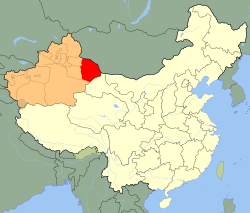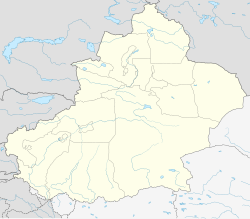Hami Prefecture
|
Hami 哈密市 • قۇمۇل شەھىرى |
|
|---|---|
| Prefecture-level city | |

Hami Museum
|
|
 Hami prefecture (red) in Xinjiang (orange) |
|
| Location in Xinjiang | |
| Coordinates: 42°50′19″N 93°30′15″E / 42.83861°N 93.50417°ECoordinates: 42°50′19″N 93°30′15″E / 42.83861°N 93.50417°E | |
| Country | People's Republic of China |
| Region | Xinjiang |
| Area | |
| • Total | 140,749 km2 (54,343 sq mi) |
| Elevation | 759 m (2,490 ft) |
| Population | |
| • Total | 541,836 |
| • Density | 3.8/km2 (10.0/sq mi) |
| Time zone | China Standard (UTC+8) |
| Postal code | 839000 |
Hami (Chinese: 哈密; pinyin: Hāmì), also known as Kumul (Uyghur: قۇمۇل, Қумул, ULY: Qumul, UYY: K̡umul?), is a prefecture-level city in eastern Xinjiang, People's Republic of China. It is well known as the home of sweet Hami melons. In early 2016, the former Hami county-level city was merged with Hami Prefecture to form Hami prefecture-level city now known as Yizhou District.
The city is known in Uyghur as Qumul or Qomul (Yengi Yezik̡: K̡umul, K̡omul). "Camul" appeared on European maps in the 16th century, and Matteo Ricci in his account of the Portuguese Jesuit Benedict Goës visit to the city in 1605 used the same spelling as well.
...
Wikipedia

